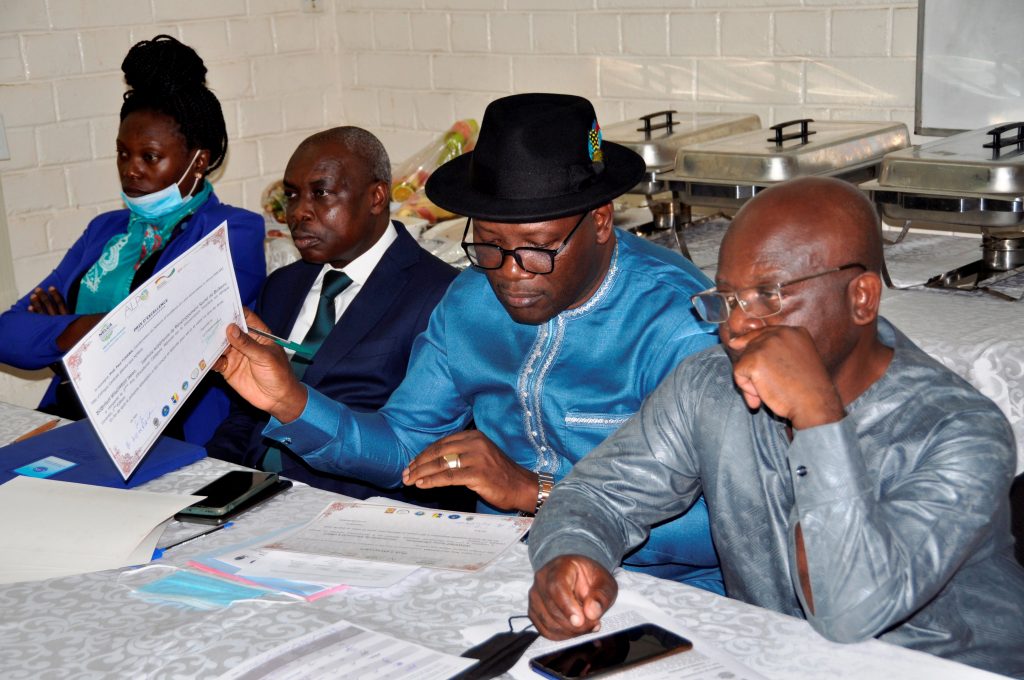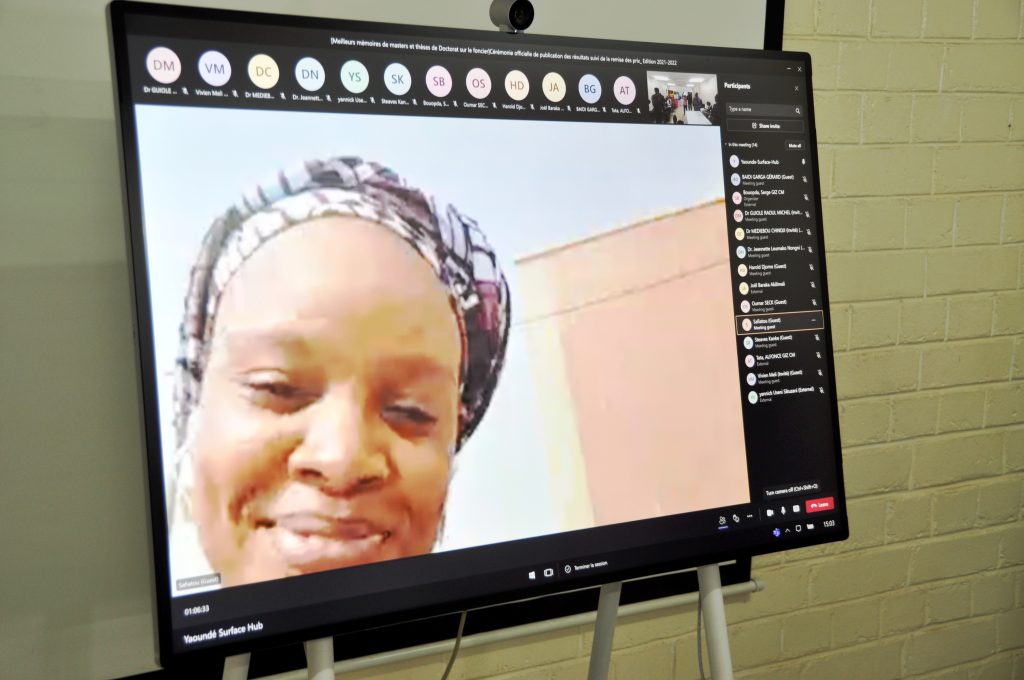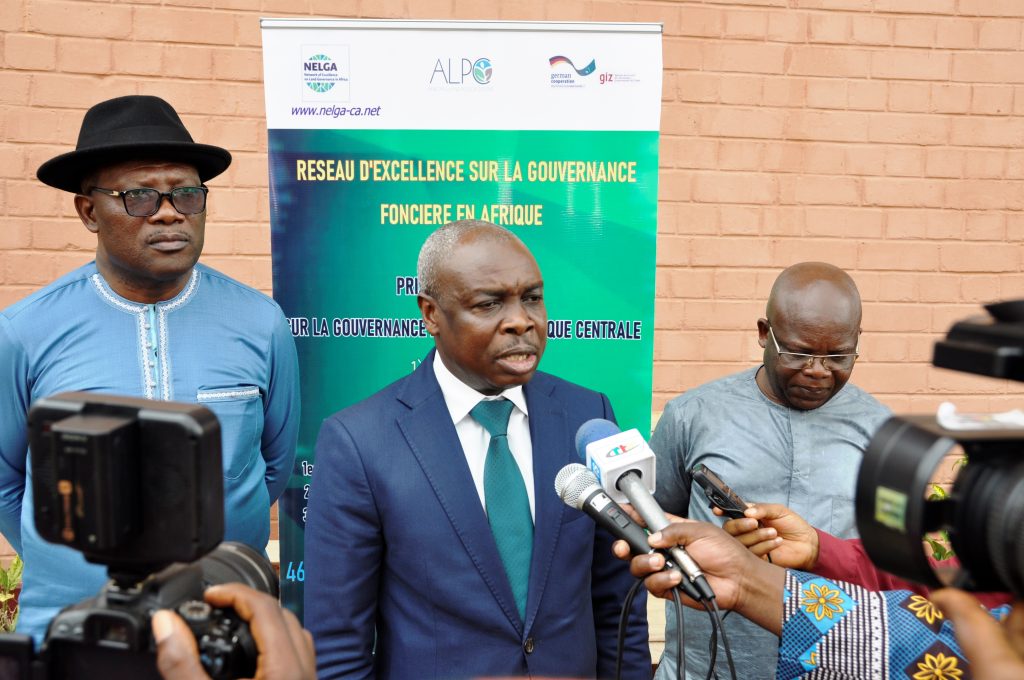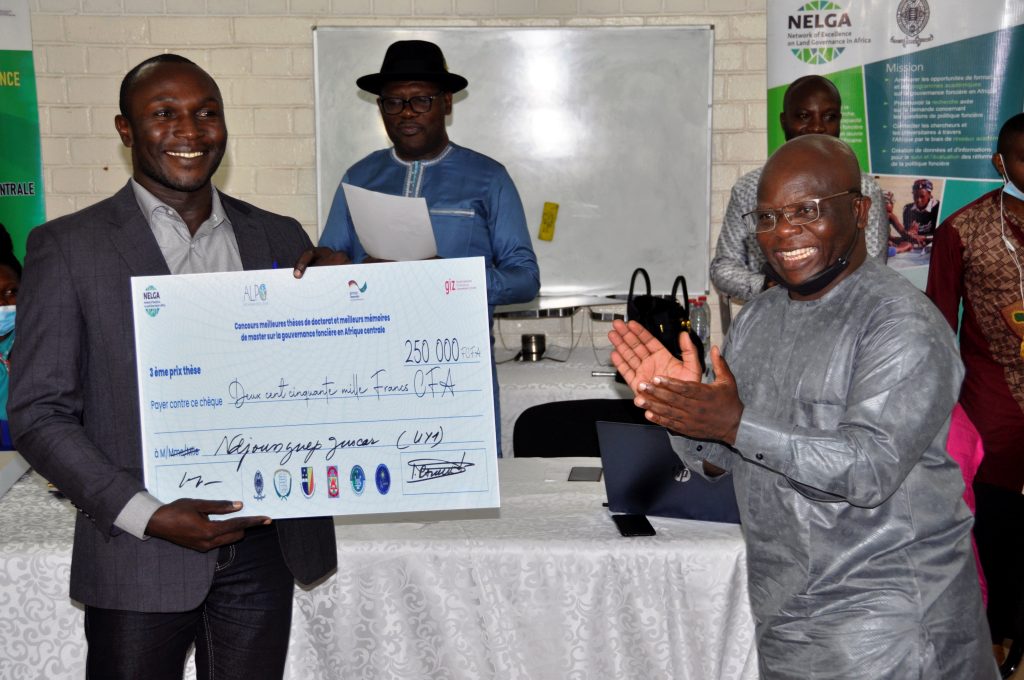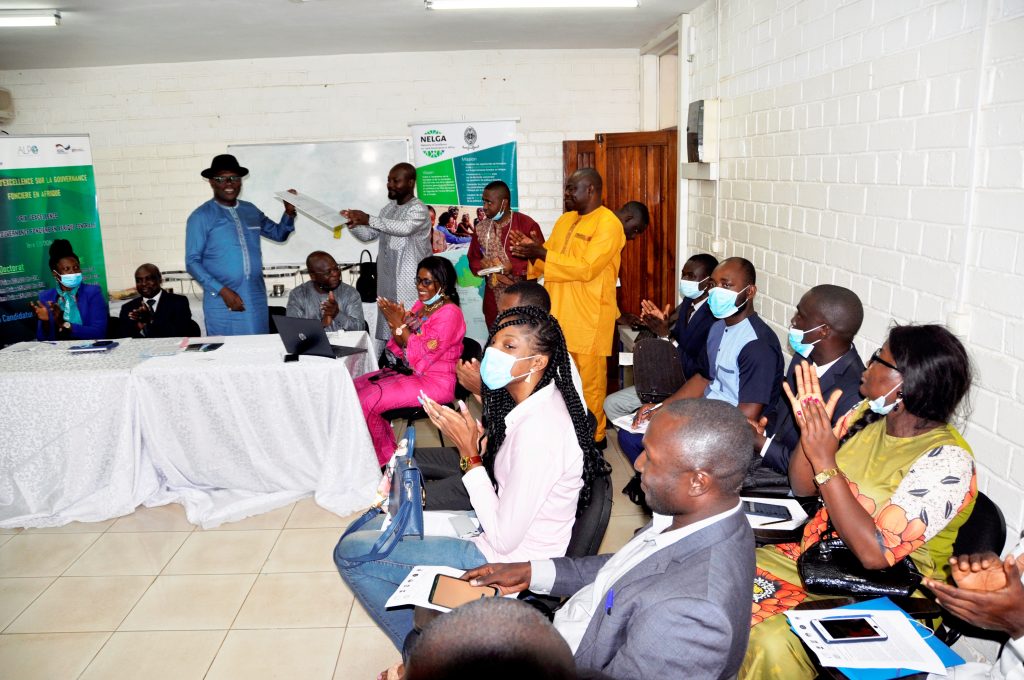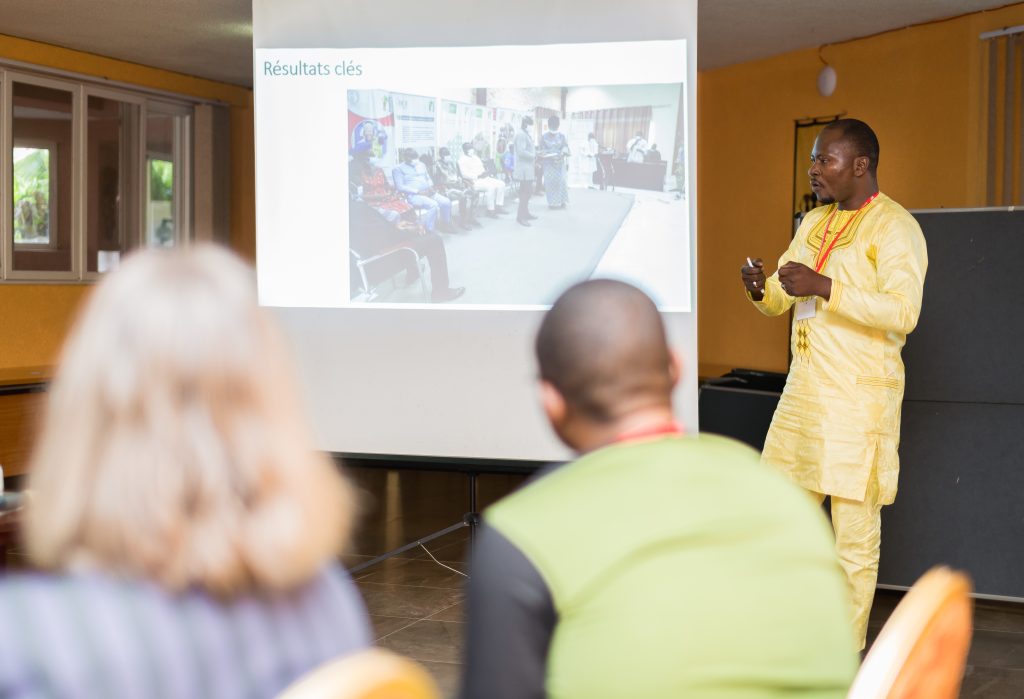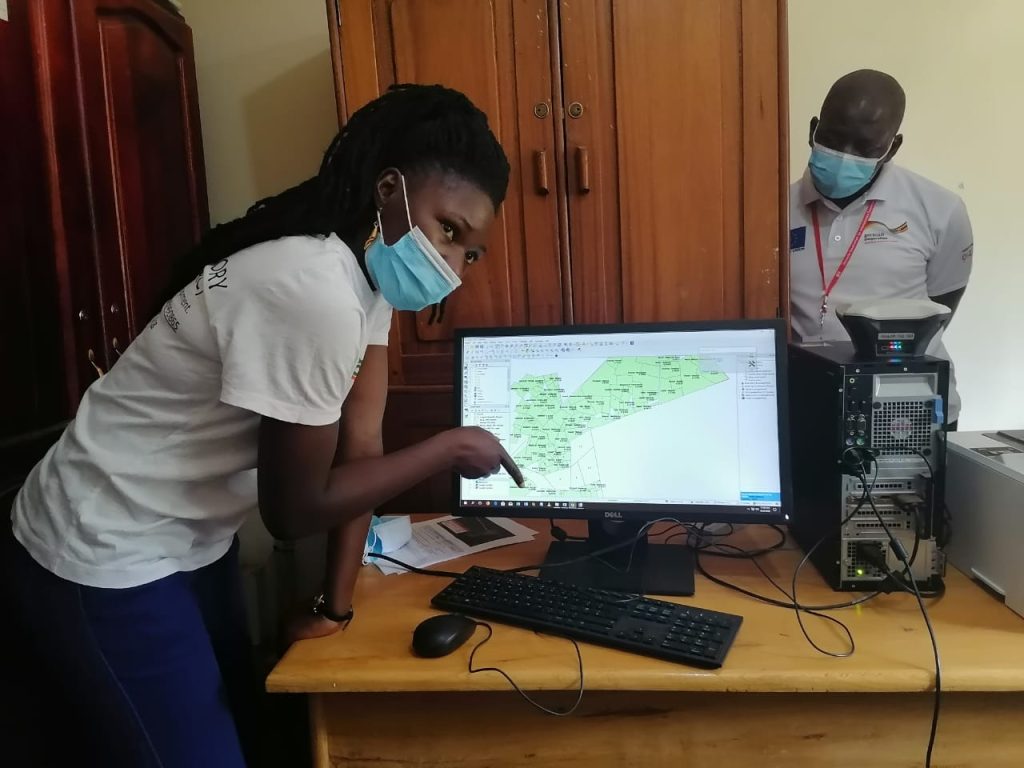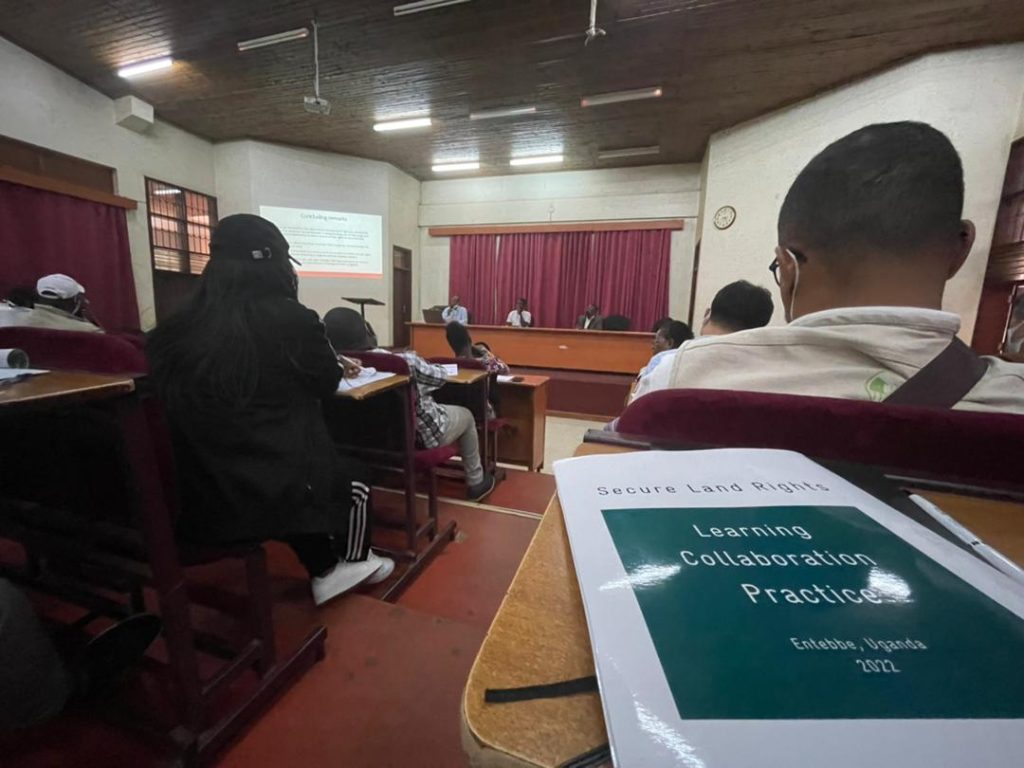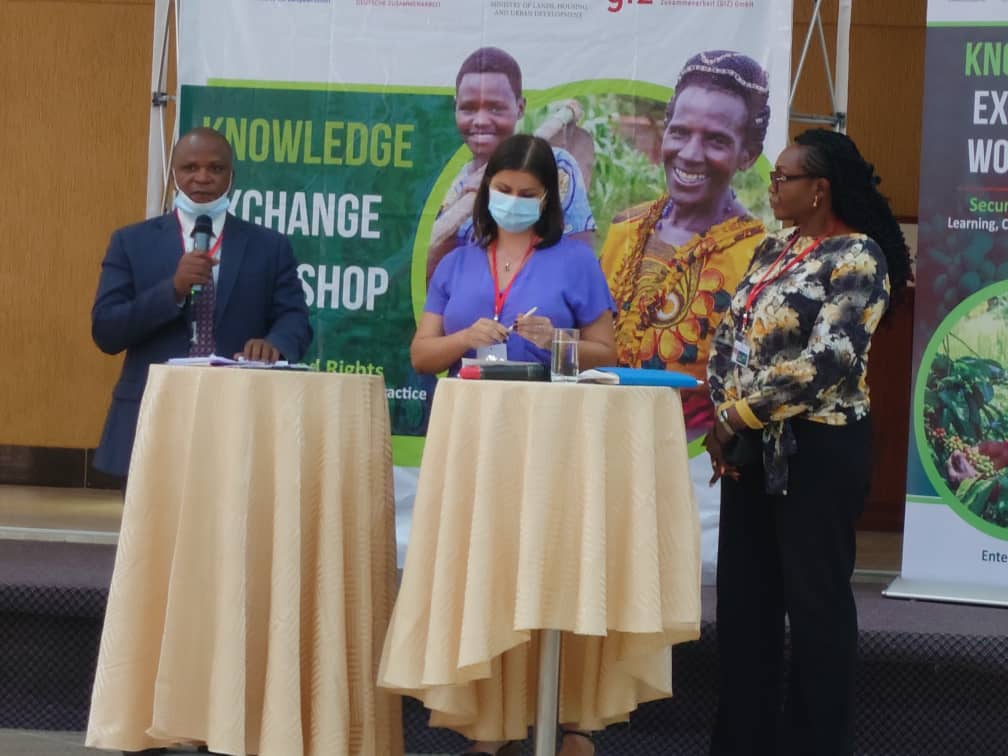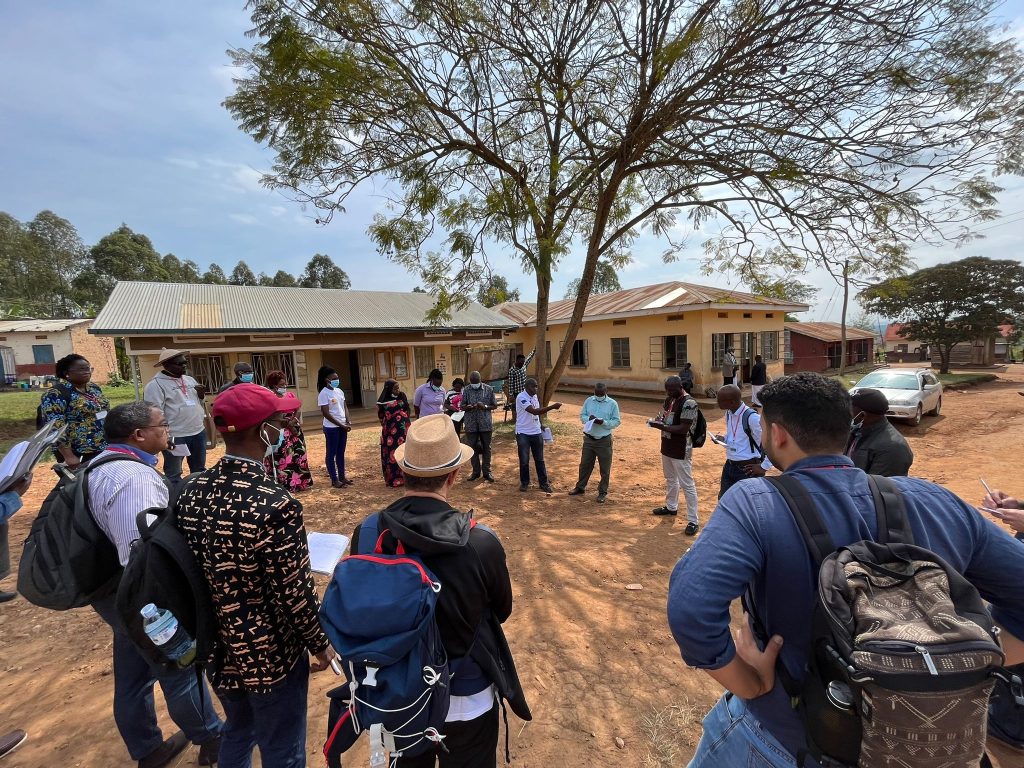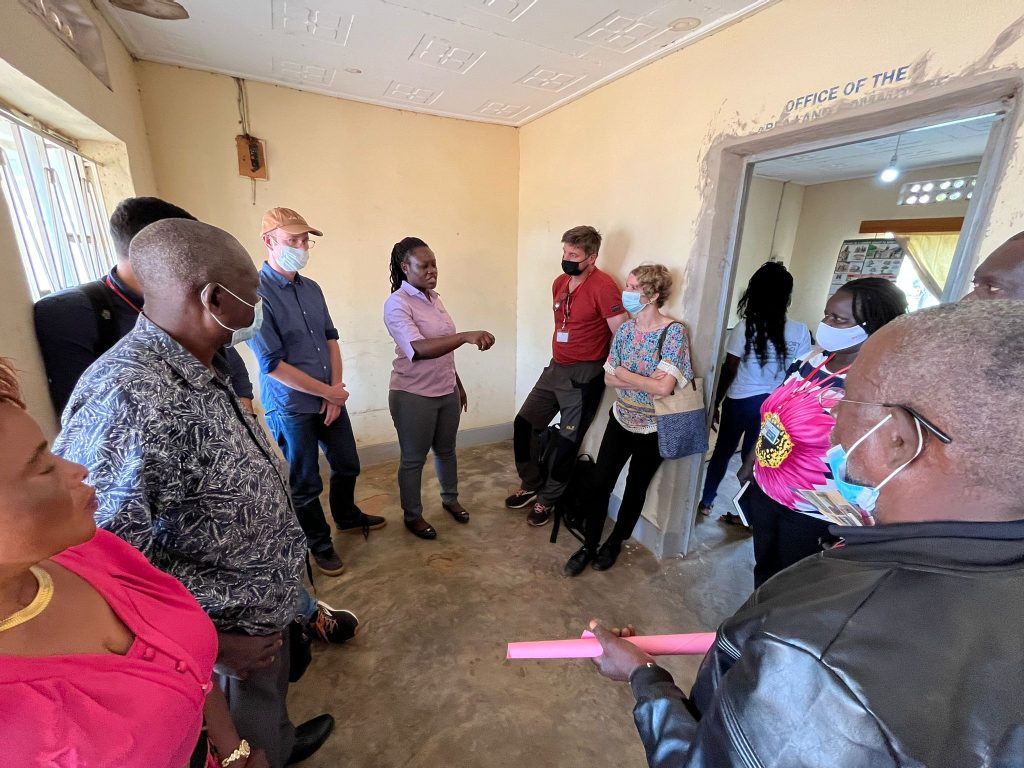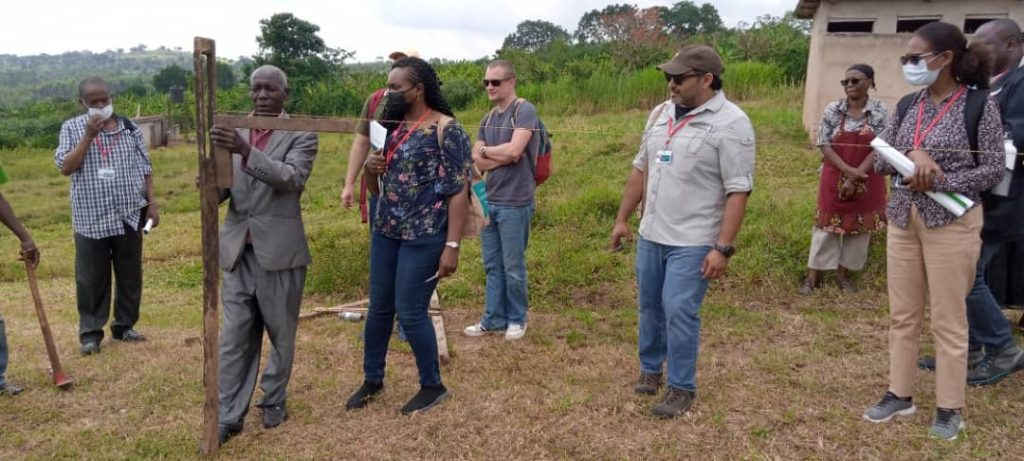Author: saront
NELGA Central-Africa Awards the Best PHD and Master theses on Land Tenure
On Friday 17 June 2022, the NELGA-Central Africa piloted by the University of Yaoundé I and placed under the coordination of Professor Tchawa Paul rewarded the best in the framework of the first edition 2021-2022 of the competition for the best PHD and Master theses on land tenure in Central Africa.
This activity was part of the work plan implemented under the partnership agreement signed between NELGA-Central Africa and GIZ for the implementation of an African Union project on land governance in Africa. The competition registered forty-six applications from Cameroon, Congo, Democratic Republic of Congo, Chad, Gabon and even Senegal; eleven applicants were female. The applications were then analysed by a scientific committee made up of six university professors including geographers, sociologists and jurists. This committee analyses the candidatures based on a set of criteria among which the scientific approach, the originality of the contribution to land governance, the interdisciplinary character and the gender approach.
In front of the fifty or so participants gathered in person and remotely to experience this event, the Coordinator of the NELGA-Central Africa published the names of the six winners. Three were from the PhD theses and the other three were from the master thesis.
The winners were the following.
The PHD thesis are:
- Mr. Kengne Fotso Fabrice of the University of Dschang
- Mr. Bonguem François Engelbert of the University of Yaoundé 2
- Mr. Ndjounguep Juscar of the University of Yaoundé 1
These students won with the respective averages of 15.6, 15.3 and 15.1 over 20. For the Master theses, the three winners were:
- Mrs Safiatou Saïdou of the University of Maroua with an average of 15.3 over 20
- Mrs Agwese Lucy Christiane of the Catholic University of Central Africa with an average of13.8 over 20
- Mr Bubala Wilondja Isaac of the Higher Institute of Rural Development whose average was 13.3 over 20.
This first edition of the 2021-2022 prize-giving ceremony for the best PhD and Master theses was enhanced by the presence of eminent personalities; among them, were the Secretary-General of the Cameroonian Ministry of Lands, Cadastre and Land Affairs (MINDCAF), the Representative of the National Coordinator of the Network of Parliamentarians (REPAR), the Representative of the Agence Universitaire de la Francophonie (AUF), members of the Scientific Committee, and representatives of civil society organisations.
The themes on which the winning students worked were as follows:
- Forestry legislation and securing land rights: the case of Cameroon and Gabon
- Land rights of indigenous peoples in Cameroon
- Participatory mapping: A tool for dialogue and conflict prevention in the communities of Nguti, South-West region of Cameroon
- Socio-cultural determinants and women’s access to land in Maroua: between traditions and social changes
- Gender and the fight against land inequalities in Central Africa: the case of Cameroon
- Effectiveness and relevance of innovations promoted by non-state actors in securing land in South Kivu in Eastern DRC.
In presenting the winners with their provisional cheques, Professor Tchawa Paul congratulated them on their work and called on the non-winning candidates not to be discouraged, but rather to prepare for the next edition. He also invited the students present at the ceremony to stay connected to the NELGA-Central Africa website and even to join the NELGA research WhatsApp group in order not to miss any news in the future.
Moroccan Government, NELGA North Africa Hosts Series of Meetings to Improve Land Academia-Industry Collaboration
From June 27 to 29, 2022, land experts from across Africa will meet in Rabat, Morocco under the invitation of the Minister of Agriculture, Fisheries, Rural Development, Water and Forest, H.E Mohammed Sadiki and NEGA North Africa node, to improve the research-policy synergy in the country and Africa.
This event brings together national, regional, and international experts to build a concrete framework of collaboration between academia and industry in the domain of land policy and land governance. The meeting discussion goes beyond analysing the traditional challenges to an effective academia-industry relationship but also addresses new issues such as developing efficient dialogue and communication platforms which transform research into marketable products.
The three-day event will address the following themes:
- Academia-industry interaction strategy on land policy and land governance,
- Actor’s point of view on land tenure management strategies: what is land governance?
- Land tenure systems and land rights issues regarding women, young people, and the community,
- Regulatory, Institutional, and technical considerations of Land Governance Policy and
- The integration of Géo-ICT in land policy and land governance.
The event will also discuss challenges; addressing questions of how to develop land policy strategies, establish land governance paradigms, and promote research programs that encourage knowledge sharing by creating awareness among researchers about pitching research in the right environment to create greater impact.
It is expected that the meeting will address the main demands of industry towards implementing research-based responses to land policy development while reinforcing knowledge sharing and technology transfer as essential in creating a comprehensive set of best practices and marketable products. It is also expected that the meeting will establish a reference guide on land governance expertise which enables the collaborative framework between academia and the government.
To register, click here: Meeting Registration – Zoom
Academics Push for National Research Agendas on Land Governance in Africa
The Knowledge Exchange Workshop (KEW) held on June 21, 2022, in Entebbe, was an opportunity for NELGA partners and land stakeholders to discuss and demonstrate the usefulness of research as a tool to support the formulation and implementation of land policies.
The session examined knowledge-to-policy-uptake in Senegal and Cameroon by outlining how such uptakes on land governance issues can be improved on a national and continental level. The session also featured case studies from Benin and Burkina Faso, elaborating an implementation model of the government policy on the sedentarisation of agro-pastoralist communities.
The discussions highlighted the importance of cooperation between research and parliamentarian bodies to explore linkages in formulating land-related policies and laws. The vision of this research is to inform legislation, but in Burkina Faso, there are difficulties in establishing contacts and spaces for discussion between academic institutions and the parliamentarian body.
The academic community in Benin is well organised and as such, the process for successful collaboration between research and policy/legitimacy Land Tenure Concerns Inventory has been developed. Academics in Benin are trying to improve the research aspect based on the needs expressed in the platform by CSOs and policy; by – among other things – condensing hundreds of pages of research into policy briefs, making it easier for the research to be available and used as a tool for communication with the policymakers. Seeing how pertinent research is in this context it is important to take stock of available knowledge and support its vulgarization and dissemination in the context of diagnostic studies. It is also important to strengthen multi-stakeholder platforms as a tool for elaborating on research agendas amongst stakeholders. One of the ways this can be accomplished is by strengthening NELGA as a platform of engagement and collaboration between policy and science across Africa.
This discussion highlights the relevance of research as a tool to support the implementation of land policies and reflects on approaches to establishing policy-science dialogue platforms at national levels. The session features case studies from Benin, Burkina Faso, Senegal and Cameroon examining knowledge-to-policy-uptake, from the continental to the national level. It outlines how such uptakes on land governance issues can be improved on a continental level and how this level interacts with the national level.
NELGA Holds Knowledge Exchange Workshop on Secure land rights – learning, collaboration, and practice
While significant global land tenure security achievements have been made over recent years, numerous challenges still remain. Advanced land management systems require a high standard of technical and administrative capacity, particularly as digital approaches are mainstreamed. Linking practical approaches and research in land management to policy often requires a combination of context-specific, holistic and cost-efficient solutions.
As a response to the above challenges, the German Federal Ministry of Economic Cooperation and Development (BMZ) commissioned GIZ in November 2015 to implement two global programmes on land governance, namely the “Global Programme on Responsible Land Policy†(GPRLP, hereafter called the Global Programme) and “Strengthening Advisory Capacities for Land Governance in Africa†(SLGA).
The Global Programme aims to improve access to land as a central precondition for poverty reduction and improving food security in rural areas, focusing on women and marginalised groups in selected countries. It currently implements activities in Benin, Ethiopia, Laos, Madagascar, Uganda, Burkina Faso, and Côte d’Ivoire, focusing on:
- improving procedures to secure land tenure rights of the rural population;
- strengthening civil society;
- cooperation with the private sector.
“Strengthening Advisory Capacities for Land Governance in Africa†(SLGA) focuses on strengthening institutional and human capacities for better land policies in African countries. The programme operates on a continental level through regional hubs and in the African Union member states. It collaborates closely with the African Land Policy Center (ALPC) and offers scholarships and exchanges via DAAD (German Academic Exchange Service).
Objectives of the Knowledge Exchange Workshop 2022
After 6.5 years of implementation in various countries, the two land governance programmes have supported a wide range of development options, adopted practical land rights formalisation approaches and incorporated them into policies. In addition, the creation of scientific networks has already proven to support the topic of land governance in training and research.
With several years of implementation still ahead, this is an ideal moment for the two global programmes to join hands, share successful experiences and lessons learnt, and define new ways forward in land tenure jointly with national partners in target countries. With a focus on South-South Exchanges, the programmes would like to make available increased knowledge and experiences across technical fora and networks. Thereby creating an opportunity to strengthen the topic of land tenure in a broader, more sustainable, and institutionalised manner.
In this Knowledge and Exchange Workshop, the organisers aims to:
- Reflect on responsible land policy development and implementation in partner countries based on scientific/expert input and policy advice;
- Share experiences, successes and challenges with a broader audience;
- Generate orientations for partner countries for future implementation and beyond;
- Strengthen the network of land experts and foster regional exchange; and
- Foster learning across countries and organisations for new land approaches.
The Knowledge Exchange Workshop will focus on four thematic areas, which are:
- Sustainable integration of fit-for-purpose (FFP) approaches into government procedures and policy for upscaling;
- Bridging gaps: demand-driven research for informed land tenure policy making;
- Fostering suitable frameworks for responsible land investments;
- From Reach to Benefit and Empower – Gender Transformative Approaches in Theory and Practice.
The content will include a range of sharing and discussions formats such as:
- Exchange of experiences to foster mutual learning and inspiration;
- Expert / scientific inputs on successful approaches;
- Presentations of good practices in target countries;
- Round tables/panel discussions, parallel sessions with results sharing;
- Multi-stakeholder exchange and policy dialogue;
- An excursion at the beginning of the KEW to appreciate the Ugandan experiences;
- Specific exchange format dedicated to participating Civil Society Organisations.
Les Meilleures Thèses et Mémoires sur le Foncier en Afrique Centrale Récompensées
En 2021, dans le cadre de la mise en Å“uvre des activités du projet “Renforcer les capacités de Conseil en Gouvernance foncière en Afrique”, le pôle d’Excellence NELGA a lancé un concours des meilleures thèses de Doctorat et mémoire de Master sur la question foncière en Afrique centrale. Il s’agissait pour toute personne ayant rédigé une thèse ou un mémoire récent sur la question, de la soumettre dans le cadre du concours. Pour les thèses, 13 candidatures dont celle d’une femme ont été reçues par le comité d’organisation contre 33 candidatures dont celle de 10 femmes pour les mémoires. Le comité scientifique ayant planché sur la sélection des meilleures candidatures était fort de 06 personnes. Sur la base de critères intégrant les aspects de genre, le Comité, dans le cadre de différentes séances de travail, a apprécié les différentes candidatures et rendu sa copie. Â
Pour la publication des résultats et la remise des prix aux meilleurs candidats et candidates, une cérémonie est prévue le 17 juin 2022 à l’AUF, 14 :00 à 16 :00 (UTC+1). Cette cérémonie en même temps qu’elle marque la première édition (2021 – 2022) de ce genre d’évènement permettra de célébrer l’excellence académique et scientifique en Afrique centrale sur les questions foncières.
Vous pouvez participer à la cérémonie en cliquant sur le lien ci-après: https://teams.microsoft.com/l/meetup-join/19%3ameeting_NmY5MGViMzItODNiZS00NDczLThiYmMtODc2MTI3NWQxODJh%40thread.v2/0?context=%7b%22Tid%22%3a%225bbab28c-def3-4604-8822-5e707da8dba8%22%2c%22Oid%22%3a%222b0af0bc-9114-49d2-ba12-e8bda0eaf348%22%7d
Celina’s Success Story – NELGA Scholar
Celina Kafute Awala, a Lecturer and a single mother of four, pursuing a Doctorate of Spatial Science with a sponsorship from DAAD at NUST shares her experiences with NELGA and the DAAD program.
I was born on 01 June 1981 and raised in the small village of Onamanape in the then Ombalantu district, in northern Namibia closer to Namibia-Angola borders. My father was a seasonal worker in Walvis Bay and my mother was a housewife and subsistence farmer. My parents did not have any formal education, however, my mother through the Roman Catholic church, learnt how to read the bible and eventually started preaching and taught other people catechisms for baptism which led them to be given national documents. I am the lastborn of seven from my mother and my father, however, my father was a polygamist, so we were 16 altogether from our two mothers. Growing up, our house was a happy place and I pretty happy childhood.
My early education was pretty memorable. I attended my primary education at Onembaba Combined School. Even though the school was far from home and there was no clock in our house, my mother would wake me up at dawn to get to school and arrive most times before my teachers. I loved school. It was a place where I met my friends, played a lot and shared meals. After school, I looked after our goats, again another place for interaction and play. I attended secondary school at St. Joseph’s Roman Catholic High School, outside Windhoek, the capital city. This was a life-changing experience, from village to boarding school, especially with English and Afrikaans that were mostly used for communication in the hostel and at school. However, I eventually caught up. This is where I learnt about responsibility, being on my own, and survival.
Upon completing high school in 2000, I applied for electrical engineering at the then Polytechnic of Namibia (now Namibia University of Science and Technology, NUST), however, I failed the mathematics entry test. On the last day of registration, without much information on the options, as I browsed through the prospectus, I stumbled on Land Management, specifically Land Measuring, and I thought it was practical like engineering and so I registered.
I enjoyed land measuring, which was my introduction to land surveying. After one year, I got a National Certificate and then continued to a Diploma in Land Management 2003, and a BTech Land Management, specialisation Land Information Systems in 2006, subsequently. After finishing my undergraduate studies, I worked at Geo Business Solutions cc as a junior GIS consultant responsible for cadastral data capturing and updates. In February 2007, I started a new position at the National Planning Commission (Central Bureau of Statistics) as a GIS Data Analyst responsible for spatial data analysis, geodatabase management, Metadata creation and supervision.
I do enjoy school and building my knowledge in land information space especially as the information environment keeps evolving. In 2008, I applied and was awarded an Erasmus Mundus Lot 10 scholarship to further my studies at the Faculty of Geoinformation and Earth Observation Sciences (ITC), University of Twente, in the Netherlands where I graduated with a Master of Science in Governance and Spatial Information Management in March 2010. I worked in other private firms but in December 2010, I got a job at the Directorate of Survey and Mapping in the then Ministry of Land Reform as a Cartographer responsible for cartographic products quality control, georeferencing, mapping, and supervision. This was a game-changer as I was in the government space contributing to the decisions on land information systems. During my work at the directorate of Survey and Mapping, I was involved in the Coastal Sensitivity Mapping and Electoral Mapping projects. Both projects were important for their use of geographical information systems in managing resources and decision-making processes.
However, the pull to be a teacher was strong and in July 2014 I started work as a lecturer of land administration at NUST responsible for courses such as land policies and institutions, land tenure management, Governance and Spatial information Management and later coordination of Work Integrated Learning. I found teaching interesting as I can relate my work experience to my lessons. I also needed to be an expert in my field. I decided to apply for a PhD to help meet that dream, for my students, my colleagues, and most especially for me. I am currently pursuing a Doctorate of Spatial Science with NUST with sponsorship from DAAD under the NELGA program. The scholarship experience is overwhelming, always meeting and interacting with people from different backgrounds and exchanging knowledge. Through this scholarship, I got an opportunity to attend a summer school in Frankfurt, Germany in 2018, after which I was taken up as an assistant tutor from 2019 to date. My research interests are public sector geoinformation management, land tenure management and governance.
At the beginning of my scholarship, I had little knowledge of research, I struggled a lot in conceptualising ideas, however, due to many events organised under the DAAD/NELGA scholarship programme, my understanding of many general land administration concepts has improved.
It has not been easy combining my academic aspirations and my being a mum of four beautiful children. However, I enjoy the challenges that comes with providing for them and meeting my academic needs. I count myself blessed and cherish all the experiences and opportunities.
After the completion of my study, I would like to start a programme to train young Namibians in research methodologies as we lack local capacity in this area. It is believed that decision-makers do not read journal articles but the information I get, I try to pass on in my classes and in the form of opinion pieces in the local newspapers as it can reach the local community in different capacities. I also want to see the improvement, implementation and use of spatial data in decision making at the lower levels of public administration.
Martie’s Success Story – NELGA Alumni
Martie Mushaukwa is a 2017 NELGA-DAAD Scholarship Alum with the Namibia University of Science and Technology. In his words, he shares his story on how NELGA’s support helped achieve his career goals.
I was born in the northeast part of Namibia in the Zambezi Region, in a small settlement known as Lusese, where I grew up with my brothers and sisters, raised by my father and stepmother. As a child, I only wished to be a better person which was supported by my father and his push for his kids to get a better education and succeed through hard work. At a young age, all I knew was to pass my classes, courses or exams. I could not understand how others failed class tests or homework that is until I got to high school, where my activeness in social life became more meaningful.
After completing high school, I was not sure what I wanted to study. I ended up enrolling for a degree in education at the University of Namibia. Within a short period of time, I realized that the career path I was about to take was not what I had imagined. I decided not to enrol in any field of study and devoted the whole year to getting better career guidance. The following year I settled for a career in real estate. This led to my enrollment for a Diploma in Land Valuation and Estate Management at The Polytechnic of Namibia (now transformed into Namibia University of Science and Technology, NUST). In 2013, I decided to further my studies by pursuing a Bachelor of Property Studies (Honours) at the same university. Upon graduation, I decided to further my studies in my field and In 2017, I was awarded a DAAD Scholarship through the NELGA programme to further my studies toward a Master of Spatial Science at NUST.
My experience with DAAD and NELGA was great. It enhanced my professional career, in the sense that after I obtained my master’s degree, I became more attractive as a job candidate and more knowledgeable in my field of specialization. I am thankful to the DAAD and NELGA for the scholarship as it has made my education and career goals easier to achieve. With this scholarship, I became a better researcher and analyst in my field of specialization. These endear me to my contemporaries in my field of work.
Since graduating, I have been working for an agricultural bank, where I am at the forefront of developing, implementing, and guiding the real estate valuation function within the organization, thus providing an overall framework for valuation approaches and practice. Hence, I have become one of the key leading professionals in the field of Real Estate, engaging in real estate matters and contributing to vital decision making at a high level.
Martie’s Success Story – NELGA Alumni
Martie Mushaukwa is a 2017 NELGA-DAAD Scholarship Alum with the Namibia University of Science and Technology. In his words, he shares his story on how NELGA’s support helped achieve his career goals.
I was born in the northeast part of Namibia in the Zambezi Region, in a small settlement known as Lusese, where I grew up with my brothers and sisters, raised by my father and stepmother. As a child, I only wished to be a better person which was supported by my father and his push for his kids to get a better education and succeed through hard work. At a young age, all I knew was to pass my classes, courses or exams. I could not understand how others failed class tests or homework that is until I got to high school, where my activeness in social life became more meaningful.
After completing high school, I was not sure what I wanted to study. I ended up enrolling for a degree in education at the University of Namibia. Within a short period of time, I realized that the career path I was about to take was not what I had imagined. I decided not to enrol in any field of study and devoted the whole year to getting better career guidance. The following year I settled for a career in real estate. This led to my enrollment for a Diploma in Land Valuation and Estate Management at The Polytechnic of Namibia (now transformed into Namibia University of Science and Technology, NUST). In 2013, I decided to further my studies by pursuing a Bachelor of Property Studies (Honours) at the same university. Upon graduation, I decided to further my studies in my field and In 2017, I was awarded a DAAD Scholarship through the NELGA programme to further my studies toward a Master of Spatial Science at NUST.
My experience with DAAD and NELGA was great. It enhanced my professional career, in the sense that after I obtained my master’s degree, I became more attractive as a job candidate and more knowledgeable in my field of specialization. I am thankful to the DAAD and NELGA for the scholarship as it has made my education and career goals easier to achieve. With this scholarship, I became a better researcher and analyst in my field of specialization. These endear me to my contemporaries in my field of work.
Since graduating, I have been working for an agricultural bank, where I am at the forefront of developing, implementing, and guiding the real estate valuation function within the organization, thus providing an overall framework for valuation approaches and practice. Hence, I have become one of the key leading professionals in the field of Real Estate, engaging in real estate matters and contributing to vital decision making at a high level.
Twenty-Two Students are the First to be Enrolled in the new NELGA Land Governance Masters at UGB
The course aims to address land governance peculiarities in the region for social development
In 2021, twenty-two students from across Africa made history as the first set of people to be enrolled in the new Master’s Degree program on Land Governance and Territorial Management at Gaston Berger University of Saint-Louis (UGB ) in Senegal. The Master’s program introduced with the help of NELGA provides a platform to develop adequate human and technical capacities to support the development and implementation of land policies in Africa. The students are subject to an interactive and interdisciplinary pedagogy regime with continuous personal follow-up of the Masters’ leaders.
Prof Ibrahim Diallo, Coordinator of NELGA Francophone West Africa and Professor of Public Law at UGB expressed his delight at the new academic program welcomed by the
academic and professional world at the sub-regional and continental levels. The course considers the region’s peculiarities and the AU endorsed Guidelines for the Development of Curricula on Land Governance in Africa, “West Africa’s diversity in terms of language, colonial history, political regimes and stages of economic development has resulted in pluralistic land tenure regimes. The Master’s program attempts to address such land governance issues in West Africa and offers vocational education, articulating theoretical and practical training in land governance and land management,” articulates Prof. Diallo.
The academic program provides NELGA-DAAD scholarships to the enrolled student. It ends with a mandatory internship that concretizes the orientation of the master towards professional practice with practical experiences on topics such as land systems, land legislation, domains, spatial planning, land market, land information systems, territorial cooperation and planning, environment and climate change, impact studies, land conflicts and others. The program prepares students for the employment market post-graduation as the internship facilitates the positioning and placement of young people in the public or private sector. “This academic program is an asset to the region and the continent as it integrates a review of the past and possibilities for the future by investing in the young people of today with key knowledge useful for the economic and social development of the continent,” explains Prof. Diallo.
Land Stakeholders in Senegal Plan to Address Parliamentarians on Land Reforms
Land governance stakeholders in Dakar will meet policymakers to discuss reforms needed in the land sector based on current trends in the country. The meeting on May 12 to 14, 2022, is convened by the Network of Excellence on Land Governance in Africa (NELGA), a Francophone West Africa node that Gaston Berger University hosts. It is a follow-up meeting to a sensitization workshop held in October 2020 and calls for land reforms that promote local governance and territorial development.
The 2020 workshop initiated a dialogue between policymakers and academics on the challenges of land governance and the revival of land reform in Senegal, especially in promoting local governance and territorial development through the creation of the High Council of Territorial Communities and the recognition of new rights to citizens. These new rights coincided with the recent expansion of the powers of the National Assembly to monitor government action and evaluate public policies. At the end of the 2020 workshop, critical land governance issues that concern parliamentarians were identified, including policy and legal actions to address climate change, large-scale agricultural investments, and land conflicts. Similarly, commitments were made by the Network of Parliamentarians for the Environment in Senegal (REPES) to advocate in parliament to revive land reform processes. The meeting designed a roadmap in respect of the commitments made at the workshop.
This 2022 sensitization meeting aims to follow up on the road map and commitments made by the parliamentarians, especially in the face of the emerging issues faced by the land space since 2020. Such as the amendments to Decree 72-12 88, the Orientation Law on Sustainable Development of Territories (LOADT), and an increase in the development of land projects in Senegal as these laws and processes impact citizens’ rights to property, resources and freedoms. The 2-day workshop will feature participants from NELGA-UGB academics, REPES members, HCCT members, local elected officials, civil society, the private sector and parliamentarians. The meeting is expected to conclude with the design of a new road map to identify the next series of actions towards land governance in Senegal.
Find the concept note below.
